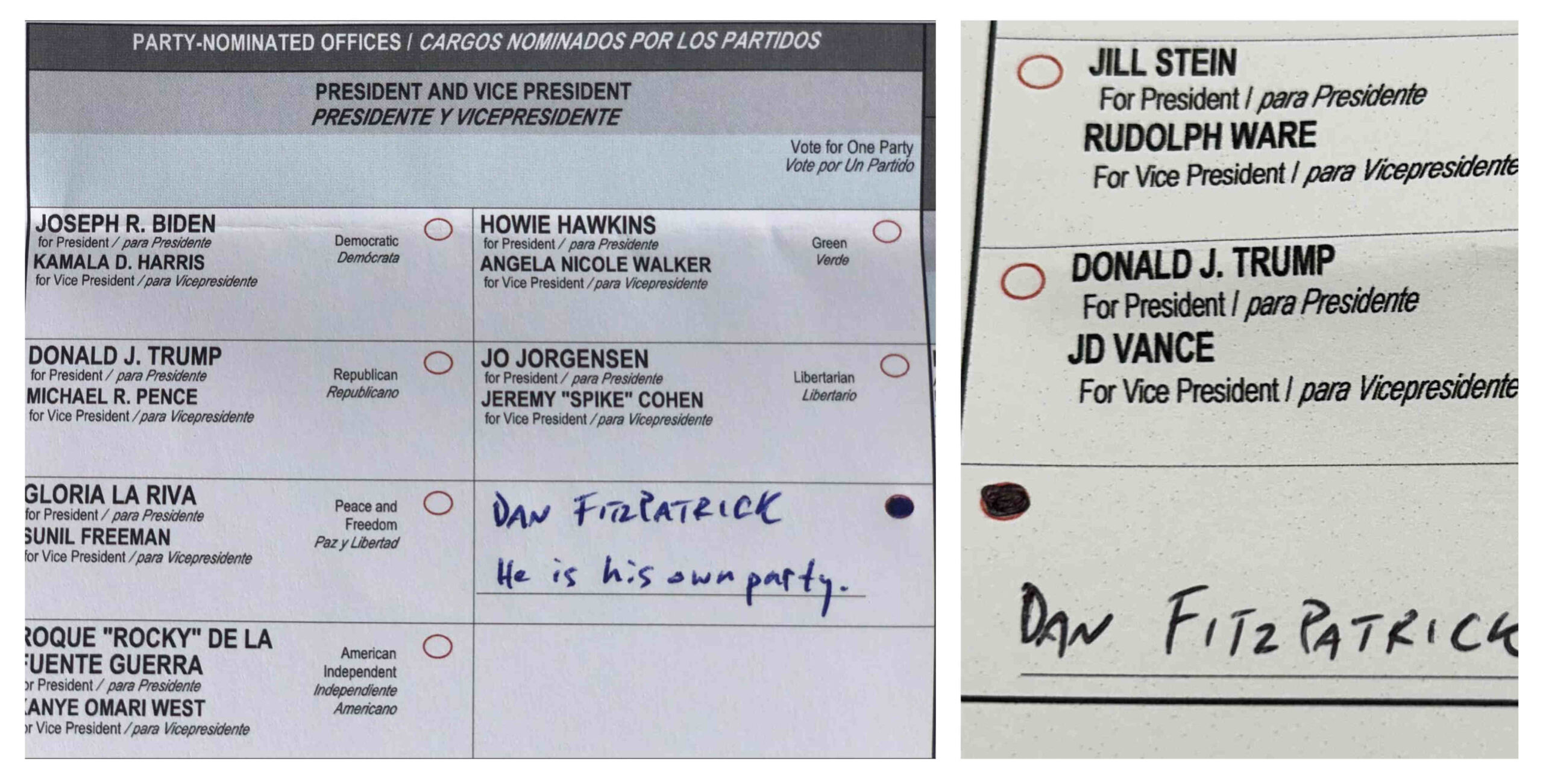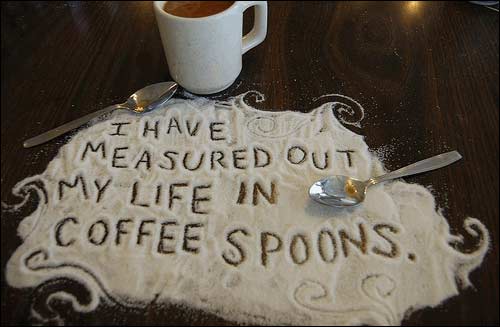I tend to agree with the ancient Athenians who, Pericles tells us, scorned the person who took no interest in politics — “We do not say that a man who takes no interest in politics is a man who minds his own business; we say that he has no business here at all.” And it is true that an inert citizenry is a wounding, if not fatal, malady for a republic. As it is sometimes said: “A democracy gets the leaders it deserves.”
I feel pique when I encounter a person who takes no interest in politics. This is that stereotypical person who hardly knows who the president and vice president are, not to mention politicians of lesser standing steering the ship of state. Whenever I hear that 50% of Americans pay little or no attention to public affairs and that only 50% of Americans vote, I hope it is the same 50% in both categories.
But I am almost more annoyed by my fellow Americans who follow politics avidly, even slavishly. To be more specific, I grow annoyed with the “true believers” (ie. the “political junkies”) who burn with fiery ardor for their political cause. And it is not so much their political passion that off puts; it is that this passion 99 out of 100 times leads them to demonize the other side of the political compass.
I sometimes wonder if my father likes his fellow conservatives Republicans more than he hates card-carrying liberals. He might have overall enjoyed George W. Bush, but he hated Barack Obama’s guts and found him dangerous to good government in the republic, as he saw it. My aunt – his sister – hated President Bush in the same way as did my father Obama. She verged on thinking him “evil.” Bush was ruining the country — no, he did ruin it, as my aunt saw it. Their blood pressure elevated when thinking on it.
Both held little room in their minds or hearts that their political conclusions might be mistaken. Both were profoundly angry with the direction of national politics. Both are decent human beings who love each other, and they have not let politics enter into familiar harmony; in this, they are wise. I suspect it has not been easy for either of them. Republics have historically suffered from this bacillus of partisan disharmony, and a country is just a larger family. The Yeats poem is overquoted but the finale still is appropriate for societies where many are at each other’s throat:
“The best lack all conviction, while the worst
Are full of passionate intensity.”
The intensity leads people to shout past each other without listening to them. There is plenty of heat in the discourse but little light. It threatens to ruin the possibility of meaningful conversation on topics of national importance.
I have a good friend that I have known for almost thirty years. But on social media – and off – he is so intemperate in his political expression that he alienates many persons while making few friends. For him, politics is combat. In this war he wages a scorched earth campaign for conservatives and against liberals (“libtards,” he calls them). And those supposedly on his side but who are not sufficiently conservative are scorned as “RINOs” — Republicans in Name Only.
I often wonder at my friend’s politics and his online expression. Nobody in the real world of politics knows or cares about what he says or thinks. It is like politics is a poison that he flings this way and that, and mostly he just poisons himself. What exactly is the point? Is venting one’s spleen in this way a good use of one’s precious time and energy?
I have a former student who is the exact but from the liberal point of view. He graduated from college and became a grass roots political organizer for a “progressive” organization. His posts on social media are mostly Manichean statements for “justice” against the dark forces of whoever are the dark forces (convervatism?). His Facebook profile picture is a photo of him looking somber next to the MLK Memorial, “The arc of history bends toward justice.” He truly fancies himself a paladin fighting for “social justice” in a life and death struggle against evil. I am sure in his mind his actions will do good, the other side evil.
What I have never seen from either my friend or my former student is any ambivalence, confusion, doubt, or humility. They never seem to change their minds. The ruts of their opinions never seem to run across the conventional lines of “liberal” and “conservative” positions. I suspect they almost never communicate with their political “enemies” – the Internet is a sort of echo chamber for the politically active where they seek out their fellow travelers and reinforce what they already know and believe. In politics they bared out the reality of Whitman when he claimed he “knitted the old knot of contrariety.”
Funny, I remember clearly powerful family dynamics in my former student’s life. I remember him confiding about a troubled and distant relationship with his father, and later a girlfriend. I found these stories compelling and appreciated his confidence. But none of his voluminous political commentary have I found interesting.
It is not that I begrudge him his political opinions. It is just that political opinions is all he seems to have nowadays. Politics seems to be his life.
Maybe the problem is that he cares too much, or lacks a sense of perspective. Or maybe the problem lies in an ideological commitment that is unwavering. For me, an ideologue whose political sympathies change not at all as the world changes is a bore. I almost never read the columns of an ideologue on the left like Paul Krugman, or an ideologue on the right like Charles Krauthammer. I see the title of their latest column, and I already know what is it going to say. Utterly predictable. It is gospel written for those who already agree with the author. It is orthodox boilerplate for one political party or the other. It is like some preacher going on and on about Jesus — boring, unless you are interested in Jesus.
I have always enjoyed writers who were not so easily categorized — or writers who had experienced conversions. I found Christopher Hitchens of much interest – a hardcore liberal in the 60s and 70s who after September 11, 2001 came to regard militant Islam as an existentialist threat to Western liberal democracy and supported George W. Bush’s invasion of Iraq. Or Nat Hentoff, a civil libertarian and for so long a typical writer for the ultraliberal Village Voice who nonetheless did not support a woman’s right to kill her unborn child. Interesting! Or the very independent-minded author Richard Rodriguez, who refused to become a spokesman for affirmative action for Latinos or Chicano politics and had grave reservations about those projects generally. Such persons spark my interest.
Show me a career military officer who is a passionate liberal. Show me a conservative Republican who is a tenured professor of sociology or education. But it almost never happens.
Maybe the problem is orthodoxy. A hardening of the lymph in people’s opinions on war or abortion or race so that few risk saying what they really think – ambivalence, doubt, or anything that might seem unorthodox. In a world with much black and white thinking, to admit to feeling shades of one and the other is to threaten the cohesiveness of one’s tribe. The individual does not so much sweat the assaults of the political “other.” They worry about being attacked by their co-believers for supposedly “betraying” the cause. They learn to toe the lie and keep their reservations to themselves. “To belong is to understand the tacit codes of the people you live with,” explains Michael Ignatieff. Regard an African American who dates a white person and is scorned by other African Americans as a “Oreo cookie” — black on the outside, white on the inside. One does not worry so much about the outsiders, but it is criticism from those near that causes real concern. These combustible internal differences are why civil wars are so often so more passionately fought than external ones.
And the more that politics comes to resemble combat, the more these lines of demarcation between the political combatants harden, the more ideological orthodoxy is insisted upon.
And this political and cultural polarization in America is much advanced in 2016 compared to 1986. Angry Americans shouting. And they shout past one another.
Maybe it is similar to family life where periods of bad feelings generally give way to better relations, and then they decline again. Feelings run hot and then cold. Good times follow bad times. A circular cycle.
I sometimes wonder how a person can live presumably mature over decades without their political opinions changing hardly at all. A person over a lifetime comes to see greater complexity as they age, but their politics remain stuck in binary conservative/liberal dialectic. Some will say that it is reductive to make a person fit a “liberal” or “conservative” label — that people’s thinking is more complicated than that. But it often seems lie the political opinions of political junkies are not much more complicated than that. If you visit Dailykos or Redstate, you will see much more passion that nuance, as the faithful preach to their fellow partisans. Those are not the places for complexity and nuance. It is the place for political cheerleading. For preaching the gospel to co-believers.
But it is doubt and ambivalence where things get interesting. I look for that in a thinker.
Maybe it is just that, in the age of sound bites and social media, may feel uncomfortable taking a point of view that is unconventional. In a time where the online mobs are ready to swarm on any seemingly politically incorrect tweet or Facebook post, self-consorship is rife in America today. A person might be deemed “insensitive” or “inappropriate.” So maybe Americans nowadays are more complicated than they appear, but their unorthodox opinions they keep to themselves and the interesting stuff – the ambivalence, the confusion, the doubts – remain in their back pocket? They won’t reveal them in a public forum? Is this why political conversation is so often so predictable and un-enlightening?
Maybe it is just easier if one is unassociated with any movement or party, as I mostly am. A person like me can switch from side to side without being excoriated for “treason” by my peers.
But even I have come under fire from certain friends and family for being a “Republican in Name Only,” or even worse.
I came to political maturity in the late 1970s and early 1980s, and I was a Reagan Republican. After four years of Jimmy Carter, stagflation, the Soviet invasion of Afghanistan, the Iranian hostage crisis, and an oil embargo, the time was right for Ronald Reagan. After nearly forty years of mostly Democratic presidents and swelling government programs and tax bills, it was time for a conservative reaction in the other direction. So I believed (and voted) in 1985, and I believe today of that time. A “Reagan Revolution” was what I thought was best for the country because of the conditions of the time. I was a Reagan Republican. So were most people.
Thirty years later I read Julian Zelizer write liberal defenses of the Jimmy Carter era liberalism on CNN, and I scratch my head and wonder. How profoundly out of tune Julian is with the spirit and current of that time! “If we just had a little more forced school busing…!” “Just another expensive social welfare program and federal bureaucracy to run it!” It is as if Zelizer’s ideological liberalism had made him tone deaf to the tunes of those times. There is a reason Ted Kennedy was never elected president.
Hence conservatives ran this country, for the most part, and I have so far voted for every president that won election: Ronald Reagan, George H. Bush, Bill Clinton (twice), and George W. Bush (twice, God help me). I was not going to vote for Walter Mondale or Michael Dukakis — New Deal Democrats in the age of Microsoft Corporation. I was like hearing a Pete Singer folk tune at a rock concert.
But, as I see it, that conservative movement was played out by 2008. The neo-Conservative push for the invasion of Iraq had proved disastrous – this incredibly bad decision to try “regime change” and plant democracy by force in a Middle East rife with religious fanaticism and authoritarian government, and seemingly bereft of moderates. As Colin Powell stated early is not attacking and occupying Iraq in 1991, “If you break it, you own it.” George H. Bush ignored this advice, invaded and took over Iraq, and tied the fortunes of the United States to a Godforsaken Iraq.
And combine this debacle with the bank meltdown of 2008, and have a “perfect storm” that symbolized, in my opinion, the end of conservative momentum for the time being. The idea that deregulation and letting bankers operate without supervision was a dead letter after the financial crisis of 2008. As free market econonmist/prophet Milton Friedman admitted, “I never thought the bankers would expose themselves to so much risk.” In the conservative 1980s businessman Lee Iaccocca was a national hero as he brought auto maker Chrysler back to life. I suspect the cultural milieu will be hostile to conservatives until a businessman again emerges to capture positive national acclaim. It is hard to imagine many Americans applauding a banker or businessman or woman.
Sign of the times.
Bankers and business leaders did not come out looking good in 1933 either.
With the disastrous Iraq War and financial meltdown of 2008, I was horrified at the national situation. As George W. Bush was about to leave office, the country was in a poor state.
A lifelong moderate Republican, I was aghast.
And after much deliberation I went to the Ventura Government Center and formally changed by registered political party from “Republican” to “Independent.” I even brought a camera and took pictures of the event, of such import was this step for me (although I cannot find those pictures). This was a big moment in my life. But if I was no longer a Republican, I could not stomach joining the Democratic Party of Jesse Jackson and Ted Kennedy.
I voted proudly two times for Barack Obama and have generally approved of his presidency. And outraged conservative by 2016 have come to sound like those out of tune liberals screaming about Ronald Reagan in 1988! Much more than a coherent message of what they want to do in power, they howl in protest and what the party in power is doing. John McCain and Mitt Romney have sounded like 1990s Republican defense hawks and pro-business candidates in a very different era. Conservatives today sound like the shrill party of complaint that screams “NO!” (as did liberals in the 1980s), while the majority votes the other way.
Those Republicans close to me have felt more than a little betrayed by my political change of heart. To see me vote unapologetically for Barack Obama – twice! is to verge on apostasy.
And I was a public schoolteacher, paying into liberal public union coffers!
One friend wrote me the following email:
August 2, 2012
Dear Richard,
I read the following paragraph from a Peggy Noonan column, and I thought of my recent conversation with you:
The central fact of the Obama campaign is that they have not yet made a case for re-election. They haven’t come up with a reasoned argument in common words that can be repeated by normal people. Ask an Obama supporter to boil it all down and he’ll flail around and then say: “But Romney is awful” or “The Republicans are bad.”
I mean seriously, what is the case for Obama’s reelection? There is none! I don’t know how you became so liberal. I think those public employee unions co-opted you into a Commie!
KE
August 4, 2012
Dear K-,
There are plenty of moderate Republicans like myself who are now independents. I didn’t change much politically over the past two decades. But the country changed. And the Republican Party changed.
http://www.foxnews.com/us/2012/07/30/conservatives-work-to-cull-moderate-republicans/
http://news.yahoo.com/conservatives-cull-moderate-republicans-163307928.htmlI cannot see myself ever joining the Democratic Party of Jesse Jackson and Barney Frank, but neither will I be a member of the Republican Party while it is persons like Mitch McConnell and Grover Norquist who are ascendant. I didn’t leave the Republican Party to go towards Barack Obama. I left the Republican Party because conservative Republicans and their angry confrontational message have taken over that party. The “Big Tent” conservatism of Ronald Reagan is dead.
I didn’t change. The country changed. And the Republican Party changed.
I would like to think I would have been a Republican in 1861, a Democrat in 1933, and a Republican in 1981.
Conversely, I hope I would not have been a Democrat in 1861, a Republican in 1933, a Democrat in 1981…. or a Republican after 2008.
Maybe I am “brainwashed” because I am a public sector employee. Or maybe I am just able to think independently without drinking the cool aid pandered by ideologues who think their party is always right at all times.
Even if I will most likely never be a Republican again, I hope it will not affect our friendship.
Very Truly Yours,
Richard
And it is as simple as that for me.
The country changed, I changed, and my political sympathies changed.
John Maynard Keynes once supposedly defended himself from accusations of “flip flopping” on an issue by responding to his accuser thusly: “When the facts change, I change my mind. What do you do, sir?”
The better question I would ask my fellow Americans is how, over their entire lives, after so much change, can they stay so much the same?
Ronald Reagan himself, after all, was a lifelong Democrat before he grew alarmed and then disenchanted with the New Deal environment of post-WWII America. Ronald Reagan the FDR Democrat had a change of heart and mind, and then he spent the rest of his storied life a convinced Republican.
I have no apologies for myself in 1985. No apologies for what happened to me after 2008.
John Kennedy once urged the following, “Let us not seek the Republican answer or the Democratic answer, but the right answer. Let us not seek to fix the blame for the past. Let us accept our own responsibility for the future.” Sage advice. But is it not naive?
Maybe the problem is emotion. The citizen should seek coolly and rationally to find the best solution for the specific problem at hand. But prejudice and passion poison the pool of reason, and that severely limits the ability to work together and find compromise.
Was it just George W. Bush and the Iraq War? September 11th and the “War on Terror”?
Perhaps.
But I also remember the enormous hatred many conservatives had towards Bill Clinton in the 1990s. How on military bases some conservatives said they could not guarantee his safety. I remember wondering how many regarded Bill Clinton as a person who had done them some specific, personal offense. Like he had sexually assaulted their wife.
And then a very politically liberal Rabbi at the Jewish school I once worked who said that she and her husband would drink a champagne toast when Ronald Reagan finally died.
Sigh.
Maybe it has always been this way. And maybe not only in contemporary American democracy but in all “democracies” at all times.
I sometimes so tire of the American media landscape and its incessant “cable news cycle” and endless political argumentation that I fantasize how it might be in a country like Saudi Arabia or Singapore. Silence. Peace and quiet. Not every blowhard engaging his “right” to scream. Where you find three persons and four political opinions.
I do not wish to dress up possible political oppression as “peace and quiet.” I tend to agree with Winston Churchill when he claimed that “democracy is the worst form of government, except for all those other forms that have been tried from time to time.”
But it is wearisome.
As Fisher Ames, in the context of the founding of the American Republic, claimed about the virtues and vices of democracy and dictatorship: “A monarchy is a merchantman, which sails well, but will sometimes strike on a rock, and go to the bottom; whilst a republic is a raft, which would never sink, but then your feet are always in water.” So our feet are in the water.
So I will say it one last time: this shameful state where a person lives ignorant of almost everything in public life; and the almost equally lamentable state of fixating exclusively on political life — of losing perspective, of caring too much about politics, of allowing it to crowd out so much else.
Or caring not at all about politics. Or caring too much about it.



